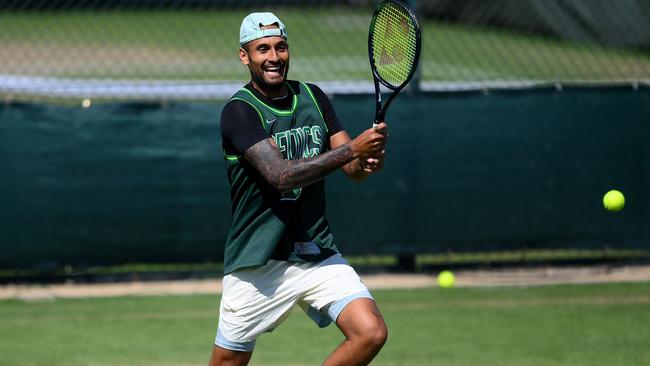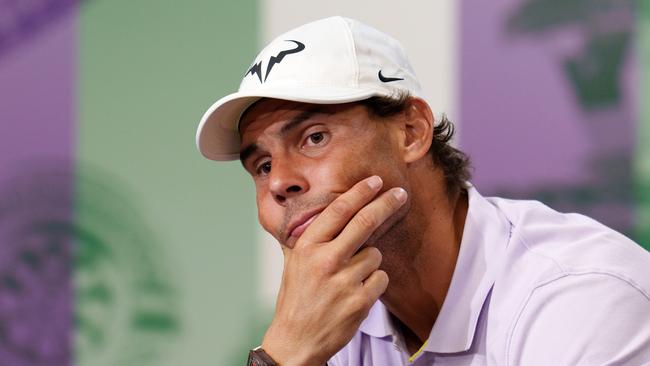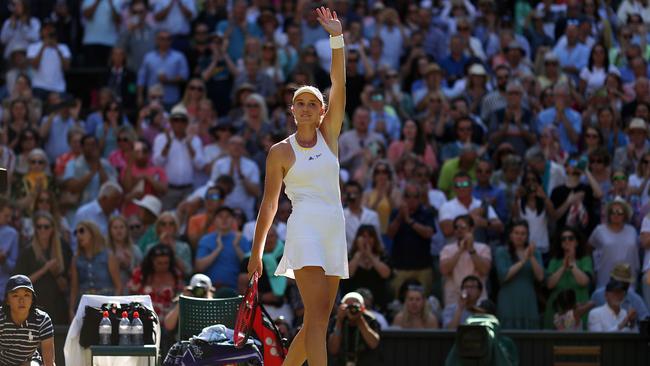Can Nick Kyrgios do this without the usual song and dance?
One-hundred-and-thirty-five years of tradition have to be respected by Nick Kyrgios when he gatecrashes the Wimbledon men’s singles final.

Centre Court at Wimbledon. You tip-toe in. The acoustics are better than Royal Albert Hall for a different sort of string symphony.
Sliced backhands? Quiet as a whisper. Full-blooded groundstrokes? The blasts of ceremonial cannons. Ghosts of Laver and Goolagong and Newcombe and Cash and Hewitt are swirling about. For a lover of tennis, nothing comes close to this joint. It’s Shakespeare’s Globe by another name.
Everything’s refined and pristine and done properly. It’s so steeped in heritage, the players could still be using wooden racquets and wearing long pants. The All England Club loves decorum as much as it loves a purple flowerbed and a punnet of strawberries.
One-hundred-and-thirty-five years of tradition have to be respected by Nick Kyrgios when the wild thing gatecrashes the men’s singles final at The Championships on Sunday. Advice? Don’t be a dickhead when you get there.
Because he’s a visitor in a foreign land. He has the breathtaking honour of playing a prestigious match inside one of the most beautiful arenas in world sport. Whether he likes it or not, he’s representing Australia in what could be a phenomenal or flat-out embarrassing occasion for us all. A men’s Wimbledon champion the year after Ash Barty won the women’s? Stone a hundred crows.
To use the vernacular, just don’t be a dickhead about it. It’s neither the time nor place for the usual song and dance. Notwithstanding the assault accusation to be decided by a Canberra magistrate, Kyrgios can go a fair way to salvaging lost support if he conducts himself in a decent manner. No one is expecting Little Lord Fauntleroy, but he needs a degree of restraint. The world and his home nation will be watching and it’s entirely possible to fight ferociously, to fight tooth and nail, without blowing his top every time he doesn’t get the rub of the green.
What an opportunity for Kyrgios to prove he’s as good a bloke as he keeps saying he is.
It was 7.30pm on Thursday (London time) when Nadal announced he was out of the tournament because of his abdominal injury. Kyrgios will face either Novak Djokovic or Cameron Norrie in a match like no other he’s ever played. Different feel. Different gravitas. It’s not the moment to flip the bird and drop F-bombs and abuse the patrons and sook and sulk and carry on like a pork chop.
The good Kyrgios will do himself proud if he performs with dignity and respect. The bad Kyrgios will embarrass himself and Australian sport if the profanities and vulgarities return. Wimbledon doesn’t officially mention a Sydney Swans-style “No Dickheads” policy … but it’s implied.
We knew Nadal was a goner as soon as he took his seat in the Main Interview Room. He wasn’t there for a casual chat. It went like this.

Moderator: “Rafa, you’ve got something to share with us.”
Nadal: “Good evening, everyone. Unfortunately, as you can imagine if I am here, I have to pull out from the tournament, no? As everybody saw yesterday, I have been suffering with the pain in abdominal. I knew something was not OK there, as yesterday I said. That’s confirmed. I have a tear in the muscle in the abdominal. The communication is late because even like that, I was thinking during the whole day about the decision to make. But I think it don’t make sense to go.
“Even if I tried lot of times during my career to keep going under very tough circumstances, in that one I think it’s obvious that if I keep going, the injury is going to be worse and worse. That’s the thing that I can say now. Feel very sad to say that.”
And with that, Kyrgios was in the final. He posted on Instagram: “Verified different players, different personalities. @rafaelnadal I hope your recovery goes well and we all hope to see you healthy soon till next time …”
Nadal said in his somber press conference: “I made my decision because I believe that I can’t win two matches under these circumstances. I can’t serve. Is not only that I can’t serve at the right speed, it’s that I can’t do the normal movement to serve. I have to say that, imagining myself winning two matches, and to respect myself in some way, I don’t want to go out there and not be competitive enough to play at the level that I need to play to achieve my goal.
“And there’s a big chance to make the things much worse, no? As I always said, for me the most important thing is happiness more than any title, even if everybody knows how much effort I put to be here. But I can’t risk that match and stay two, three months outside of the competition because that’s going to be a tough thing for me.
“It’s my decision and I have to live with that. I can’t say another thing. I am very sad and this has been a very tough one.”
There went Nadal’s hopes of a calendar-year grand slam. And there went the neighbourhood. Crikey. A Wimbledon final with Kyrgios in it. The chance for him to get his name on the most famous honour board in the sport. The one listing past champions in gold lettering on a backdrop as green as Centre Court. The one either Ons Jabeur or Elena Rybakina will be added to after their women’s final on Saturday.
“Miss A. Barty” had her name up there after she sliced and diced her way to the title last year. It was removed before this year’s tournament and replaced with “A. Barty” when The All England Club ditched its stuffy old tradition of referring to the marital status of female victors. The practice had dated all the way back to Maud Watson in the ‘80s — the 1880s — when she won the final in a white corset and petticoat.
The men’s champions have only ever been named by initial and surname — R. Laver, R. Federer, R. Nadal and so forth — but ever since Miss. M. Watson was honoured in 1884, the ladies’ mentions have been more particular and peculiar. For instance, when Evonne Goolagong won in 1980, she was written up as Mrs. R. Cawley because she was married to Roger. That always looked odd at best, blatantly chauvinistic at worst. Even more awkwardly, the 1981 titleholder Chris Evert was noted as Mrs. J.M. Lloyd because of her marriage to British player John Lloyd at the time. The honour board stubbornly had her marked as Mrs. Lloyd until this year’s rewrite — 35 years after their divorce.
N. Kyrgios to be up there? We’ll see. The next women’s champion will be either Ons Jabeur or Elena Rybakina in a final certain to make history on Saturday night. Tunisia’s Jabeur can become the first Arab to win a major after the 27-year-old beat her best mate on tour, Germany’s Tatjana Maria, 6-2, 3-6, 6-1 in their semi-final. From the far baseline, Rybakina can become the first Kazakstani to win a major after pounding Romania’s former Wimbledon champion Simona Halep 6-3, 6-3 in the second semi.

Jabeur has plotted her way through the draw as if routing a trip on the London Underground from High Street Kensington to Southfields. There’s been a few stops along the way. There’s a couple of holes in her game but never mind the gaps. She’s here now and there’s a sense of the new guard of women’s tennis having well-and-truly arrived. The old guard has lost Barty to retirement and Serena Williams to the wrong side of 40.
Who’ll win? Jabeur is more experienced but Rybakina is more explosive. Jabeur is the closest thing to Barty for imagination and flair. Her drop shots check and spin sideways as if she’s hitting approaches to St Andrews’ greens at next week’s British Open. She’s occasionally so casual you wonder if she’s really trying. The curse of the gifted.
“It’s always about Tunisia,” she says of her looming milestone. “But I want to go bigger. I want to inspire many more generations.
“Tunisia is connected to the Arab world, is connected to the African continent. The area is where we want to see more players. It’s not like Europe or any other countries. I want to see more players from my country, from the Middle East, from Africa. I think we didn’t believe enough at certain points that we can do it. Now I’m just trying to show we can. Hopefully people are getting inspired.”
Her nickname in Tunisia is the Minister of Happiness. “I mean, it’s nice of them to call me that,” she grins. “It’s really unbelievable. It’s funny because the actual minister calls me, ‘Hello, Minister’. It’s tough times in Tunisia sometimes but when they see my matches, they always say sport unites people. I’m happy they follow me. They’re pushing me to do better. Hopefully I can keep the title forever.”
***
Rybakina will be the pseudo Russian champion Wimbledon has when it’s trying not to have a Russian champion. She switched allegiances after a big financial offer from the Kazakhstan Tennis Federation in 2018. She was born in Moscow and still lives there, but it was an opportunity too good to refuse when her parents doubted they had enough cash to help her be a fulltime professional. She was 18 at the time.
“It was very good timing because Kazakhstan were looking for the player and I was looking for some help,” she says. “It was a very good combination. They believed in me and made everything possible for me to keep playing and keep improving. I had all the conditions to practice and everything. It helped a lot. They are still helping and supporting me. I’m really happy that I’m representing Kazakhstan.”
Do you feel Kazak or Russian? “I mean, it’s a tough question,” she admits. “I was born in Russia, but of course I am representing Kazakhstan. It’s already a long journey for me. I’m feeling the support of the people and I’m very happy to represent Kazakhstan because I think I’m also bringing some results which are very good for the sport in Kazakhstan. But for me, it’s a tough question to say exactly what I feel.”
Wimbledon banned Russian players in response to the Ukraine war. Having a Muscovite winner hasn’t been part of the plan – nor a men’s champion with a criminal case coming up — but Rybakina is a shy and likeable soul who’s done nothing wrong.
Asked about the exclusion of her former comrades, she says: “We are playing sport and everybody wants to compete. They were not choosing where they were born. I feel for them because everybody wants to compete at the biggest tournament at Wimbledon. I just hope that next year is going to be back to normal.”
***
They use 54,000 balls during the Wimbledon fortnight and no woman has hit them harder than Rybakina. During the semi-final, every Tom, Dick and Harriette is oohing and ahhhing at the velocity of the groundstrokes. Her serve is seriously big and she barely bats an eyelid.
“I’m just a very calm person,” she says. “I’m not showing my emotions. It’s been always like this but of course, I’m full of emotions inside.”
Jabeur will be more willing to express herself when they both chase their maiden majors. “I’m an emotional player,” Jabeur says. “You can see that on the court. Elena plays really good and I’m really happy for her that she’s representing well her country. I’m doing the same in a different way. She’s not someone who screams a lot every point, c’mon, and I respect that about her. I know she’s a very shy person even outside the court. Maybe I’ll be the one screaming tomorrow.”
Jabeur adds: “A lot of times I have imagined myself giving the good speech, holding the trophy, seeing the trophy. I did all of this in my mind. Now I need really to hold the trophy. That’s the only thing left for me. I know I can do it.
“One of the things that I hate is to disappoint myself and I hope I will not do that. I’m all the way there and there is only one match left. It’s going to be very tough and we have completely different styles, but I will be ready to do my part. Hopefully they will write my name on the board.”
*
Walking from Southfields train station to The All England Club on Thursday, I’ve struck up a conversation with a staff member called Graham. He’s asked me what Australians think of Kyrgios.
I’ve suggested we don’t know whether to celebrate his London successes or be embarrassed by his behaviour. Graham has said: “I thought Australians never got embarrassed?”
We’ll see. I suspect we’ll witness more good than bad.



